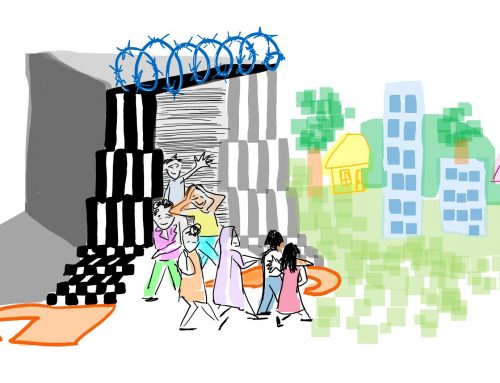Responses to the Panorama documentary on Brook House Immigration Detention Centre – will the government be let off the hook again?
The undercover Panorama documentary on Brook House Immigration Detention Centre prompted a range of reactions and comments from all quarters.
While there has been much focus on whether the G4S’s detention management contract should be terminated, some looked beyond individual allegations of abuse to a wider question of the UK’s use of immigration detention as a whole and the government’s continuing failure to reform UK’s dysfunctional and harmful detention system despite severe criticisms it has received over the years.
As expected, Immigration Minister’s response to the programme was restricted to the operational issue of G4S ‘ handling of the abuse allegations and made no mention of the detention reform that his department promised in January 2016 and still not delivered.
Full statement from @BrandonLewis on treatment of detainees at Brook House immigration detention centre here. pic.twitter.com/4k5ebDfAc7
— Panorama ? (@BBCPanorama) September 5, 2017
However, writing for the Huffpost, Diane Abbott, Shadow home secretary, Labour MP for Hackney North, squarely laid the blame on the government’s policy and practice of immigration detention. She said ‘Conditions in Brook House, as revealed in the Panorama programme, are shameful. It may have been G4S guards carrying out the brutal acts, but it is this government that is ultimately responsible.’ At the same time, she stopped short of outlining what policy changes she considers to be necessary to resolve what she calls ‘Britain’s Brutal Immigration Detention System’.
#G4S guards commit brutal acts but government is responsible for the abuse that is indefinite administrative #detention #TheseWallsMustFall pic.twitter.com/7gTH3pd2ga
— Walls Must Fall (@wallsmustfall) September 7, 2017
In their letter published in the Guardian, Freed Voices, a group of migrants who have lost over 20 years of their lives to immigration detention, stressed that what was revealed by the Panorama documentary is ‘neither unique nor isolated – but routine’. Freed Voices asserted how UK’s practice of indefinite detention ‘undermines the whole immigration system’ and ‘allows staff to act with impunity, as though they have licence to assault and abuse’ and called for a time limit on immigration detention. They concluded their letter by saying ‘The government promotes the British values of fairness and human rights around the world. It’s time to practice what it preaches at home.’
#FreedVoices @guardianletters 'abuse in #BBCPanorama -neither unique nor isolated but routine' #Time4aTimeLimit https://t.co/LZYzu5Lbtf
— Detention Action (@DetentionAction) September 6, 2017
In a separate development, 17 Bishops of Church of England together with representatives from the Church of Scotland and Methodist and Baptist churches jointly called on the government to end indefinite immigration detention. In their letter to the Telegraph, they maintained that indefinite detention and abuses in detention centres are ‘symptomatic of a rhetoric fostered by some politicians and sectors of the media that dehumanises immigrants and paints the public as ‘victims’ of immigration’ and described indefinite detention as ‘against the core fundamental principles which British law is based on.’
Letter in @Telegraph calling for immediate end to indefinite detention following our report. pic.twitter.com/em75epQWkl
— Panorama ? (@BBCPanorama) September 6, 2017
Two Early Day Motions have also been tabled in response to the documentary, displaying mixed responses from MPs.
EDM 257 PANORAMA PROGRAMME ‘BRITAIN’S IMMIGRATION SECRETS’, tabled by Keith Vaz MP, is entirely focused on the issue of whether asylum seekers should be detained in the same space as migrants who have finished their prison sentences. On the other hand, EDM 293 IMMIGRATION DETENTION, tabled by Stuart McDonald MP, ‘calls on the Government urgently to implement reform of the use of immigration detention, introducing the introduction of a 28 day time limit and greater use of community-based alternatives to detention.’
With a death of a Polish individual after suicide attempt at Harmondsworth Detention Centre confirmed only days after the Panorama broadcast and the second Shaw Review starting at the same time, more questions are likely to be raised about the government’s role in perpetuating this harmful practice. At the same time, there is no guarantee that the government will not be let off the hook yet again: while there is a high level of expectation for the second Shaw Review among NGOs, inquiries and reviews can also be used as opportunities by the government to kick the problem into the long grass. Without strong and sustained pressure on the government and a clear accountability mechanism, the promised detention reform might never be delivered. We should not forget the urgency with which migrants, their families and communities need a radical detention reform now, not in years’ time, and start taking action now.
At the Detention Forum, we believe that the government should, as a matter of urgency, commit to:
- the introduction of a 28 day time limit
- the implementation of automatic bail hearings
- much wider use of community based alternatives to detention
- ending the detention of vulnerable people
We believe that these measures will result in a significant reduction in the scale and the lengths of immigration detention and will continue to advocate for these changes.
====================================================
If you are contacting your MP about immigration detention, you might find our latest briefing paper, available here, useful.




